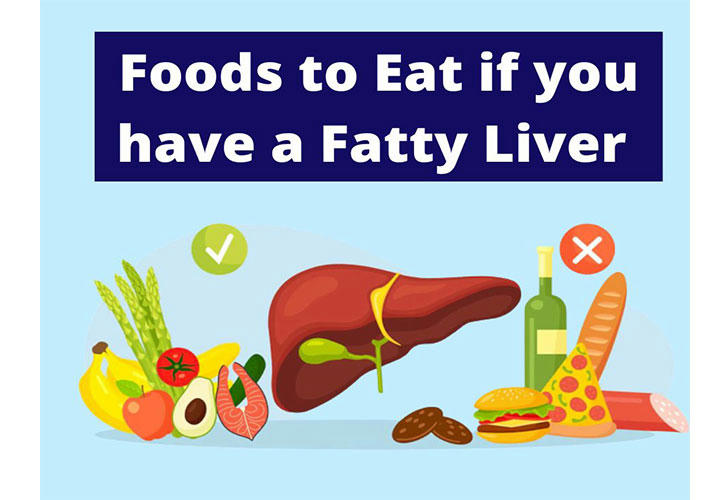What Should And Shouldnt Fatty Liver Disease Patients Eat?
Fatty liver disease, particularly non-alcoholic fatty liver disease (NAFLD), is a common condition affecting millions of Americans. It is characterized by the accumulation of fat in the liver, which can lead to inflammation, liver damage, and potentially more severe conditions like cirrhosis. While there is no specific medication for NAFLD, lifestyle changes, particularly dietary modifications, play a crucial role in managing and potentially reversing the condition.

Understanding Fatty Liver Disease Treatment
The primary treatment for fatty liver disease involves lifestyle modifications aimed at reducing liver fat and improving overall health. Key strategies include:
1. Weight Loss: Gradual weight loss through a balanced diet and exercise is essential. Losing 5-10% of body weight can significantly reduce liver fat.
2. Regular Exercise: Engaging in physical activity helps improve insulin sensitivity and promotes weight loss.
3. Dietary Changes: A healthy diet rich in whole foods while avoiding processed foods is critical.
4. Medications: While there are no specific drugs approved for NAFLD, some medications may be prescribed to manage associated conditions like diabetes or high cholesterol.
5. Avoiding Alcohol: Limiting or eliminating alcohol consumption is vital for liver health.
Recommended Foods for Fatty Liver Disease
A well-balanced diet focusing on specific foods can help manage fatty liver disease effectively:
1. Fruits and Vegetables
Examples: Spinach, broccoli, berries (blueberries, strawberries), apples.
Benefits: High in antioxidants and fiber, these foods help reduce inflammation and support overall health.
2. Healthy Fats
Examples: Olive oil, avocados, nuts (walnuts, almonds).
Benefits: Rich in monounsaturated fats and omega-3 fatty acids, which can help lower liver fat levels.
3. Whole Grains
Examples: Oats, brown rice, quinoa.
Benefits: High in fiber; they help regulate blood sugar levels and improve digestion.
4. Fatty Fish
Examples: Salmon, mackerel, sardines.
Benefits: Rich in omega-3 fatty acids that have been shown to reduce liver fat and inflammation.
5. Legumes
Examples: Lentils, chickpeas, black beans.
Benefits: High in protein and fiber; they help maintain a healthy weight and improve gut health.
6. Low-Fat Dairy Products
Examples: Greek yogurt, skim milk.
Benefits: Provide calcium and protein without excess fat.
7. Garlic
Benefits: Contains compounds that may help reduce liver fat accumulation.
8. Coffee
Benefits: Studies suggest that drinking coffee may lower the risk of liver disease progression due to its antioxidant properties.
Foods to Avoid
To effectively manage fatty liver disease, it's important to avoid certain foods:
1. Sugary Foods and Beverages
High sugar intake can lead to increased fat accumulation in the liver.
2. Refined Carbohydrates
Examples include white bread and pastries; they can spike blood sugar levels.
3. Trans Fats
Found in many processed foods; they contribute to inflammation and should be avoided.
4. High-Sodium Foods
Processed meats and snacks can lead to increased blood pressure and worsen liver health.
5. Alcohol
Even small amounts can be harmful to individuals with fatty liver disease.
Real-Life Dietary Case Examples
1. Case Study of a 45-Year-Old Male
A 45-year-old male diagnosed with NAFLD adopted a Mediterranean-style diet after working with a dietitian. He focused on increasing his intake of fruits, vegetables, whole grains, lean proteins (like fish), and healthy fats (olive oil). After six months of adhering to this diet along with regular exercise, he lost 10% of his body weight and reported improved liver function tests during his follow-up appointment.
2. Case Study of a 32-Year-Old Female
A 32-year-old female with mild fatty liver made dietary changes by incorporating more legumes into her meals while reducing her intake of processed sugars and saturated fats. She started her day with oatmeal topped with berries and nuts and included salads with olive oil dressing for lunch. After three months, her doctor noted a decrease in liver enzymes during routine blood tests.
Recommended Products
1. Omega-3 Supplements
If you don’t consume enough fatty fish, consider omega-3 supplements.
2. Probiotic Supplements
To support gut health:
3. Meal Replacement Shakes
For those needing additional nutrients:
4. Cookbooks Focused on Liver Health
For recipes tailored to those with fatty liver disease:
5. Low-Sugar Snack Bars
Convenient snacks that are gentle on the gut:
Conclusion
Managing fatty liver disease involves significant lifestyle changes that include adopting a healthy diet rich in fruits, vegetables, whole grains, healthy fats, and lean proteins while avoiding processed foods high in sugars and unhealthy fats. By making these dietary adjustments alongside regular physical activity and weight management strategies, individuals can improve their liver health significantly.
Always consult with a healthcare provider or registered dietitian before making significant dietary changes or if you have specific concerns about your condition. By prioritizing these dietary strategies and considering appropriate supplements when necessary, individuals with fatty liver disease can take proactive steps toward better health management.
